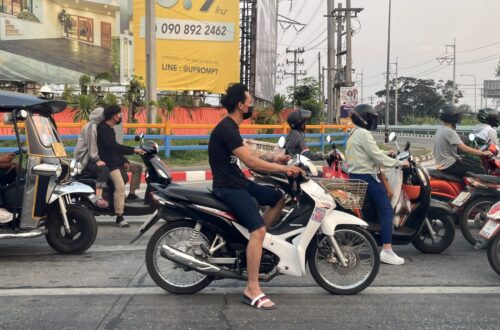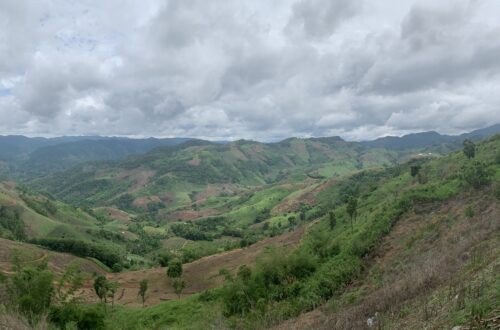-
How to Spot a Monster
I’ve often wondered with regards to human trafficking, “How do you measure the effectiveness of prevention?” It seems as if there is no metric to know if efforts on the front end have prevented the feared atrocity from occurring in the first place.
On a prevention outreach near the Myanmar border a few months ago, I witnessed first-hand encouraging evidence of the ZOE Prevention Team’s effectiveness at stopping a horror before it begun. In front of an audience nearing a thousand refugee children, The Prevention Team performed a powerful drama. Absent any dialogue, the play showcased how children are often lured into human trafficking and the many subsequent forms of exploitation.

The story began with three happy siblings enjoying their family when tragedy befell their father, now no longer able to care for his children. On stage arrived a well-dressed couple, clearly appearing at a higher socio-economic level than both the pretend children on stage, as well as the actual children in the crowd. The audience vocally cheered at the arrival of these well-to-do folks on stage who appeared as reputable heroes to the tragedy-stricken siblings. The siblings left with the well-dressed duo, in hopes of a future filled with opportunity.

Unbeknownst to the siblings, the couple were paid for introducing the crestfallen kids to an elegant woman in a beautiful, bright-red dress. With make-up, high heels, bundles of cash, and poise, she entered the stage to roaring applause and cheers from the audience. Her presence, demeanor, and attire conveyed power, wealth, and sophistication; attributes seemingly unattainable to the children in the crowd. As the story unfolded, the woman in the red dress was revealed to be not the hero the audience expected, but rather a beautifully dressed monster in disguise. She sold one of the sisters into sexual slavery. The brother was forced into hard labor. The other sister had her eye’s removed for black-market organ sales, was beaten, and forced to beg for money on the street.

It was an emotionally powerful story. While it is a fictional depiction of the real-life terrors experienced in human trafficking, none of it was exaggerated. As powerful as the drama was for me, the most memorable part was the shift in reaction from the audience. The children in the crowd were incredibly poor. Their lives have been devastated by war, poverty, brokenness, and difficulty. Tragically, pain and hardship are much of all they know. Seeing the classy, well dressed, and sophisticated actors on stage garnered an immediate reaction of ovation and approval. But as the story unfolded, the true character and motivations of those face-value heroes was unveiled and the audience’s adulations diminished. Their former applause turned to silence. Their cheers switched to gasps. Children looked away and others covered their mouths in astonishment. The apparent heroes were the actual villains. I was able to watch these children recognize there was more than meets the eye.

The truth remains, it is incredibly difficult to objectively measure the effectiveness of prevention. But if what I witnessed was any indication, those school children are now far more aware of the real-life predators actively looking for them, seeking to cause harm and destruction, desiring to take advantage of their innocence.

The rest of the outreach was filled with fun training, resources and techniques to help keep those kids safe. As the adage goes, an ounce of prevention is worth more than a pound of cure.

Helping these kids navigate life with the cards they’ve been dealt is worth all our efforts and attention, while simultaneously praying they’re never in a position requiring rescue.

-
Want to ELIMINATE child trafficking? Pray for Saul.
I’ve been reading through the book of Acts as if I’ve never encountered those stories before. With that frame of mind, I’ve encountered these familiar narratives from unfamiliar angles. I am discovering ideas and experiencing insights slightly different than I remember. The Sunday school felt board teachings are being eroded away and replaced by a harsher reality. Maybe it’s my age. Maybe it is my station in life as a missionary. Maybe it’s God deepening my faith. The reason pales in comparison to my newfound understanding.
Before the name change, Saul was particularly evil. In my previous readings of Acts, I rushed past the accounts of Saul hunting down new believers, ripping them from their homes, trumping up charges against them, locking them in prison, and stoning people, all because I knew Saul was later the Apostle Paul and Paul blends better with my sensibilities. Saul was not just a passionately religious jerk. He was a militant terrorist of the early church.
Acts chapter 9 starts off with a doozy, “Meanwhile, Saul was still breathing out murderous threats against the Lord’s disciples. He went to the high priest and ask him for letters to the synagogues in Damascus, so that if he found any who belonged to the Way, whether men or women, he might take them as prisoners to Jerusalem.” If I stop right there, and know nothing more about Saul’s story, I’d label him a tyrant. Just imagine “breathing murderous threats” being used to describe someone’s demeanor. Chapter 8, verse 3, says, “But Saul began to destroy the church. Going from house to house, he dragged off men and women and put them in prison.” This man is a church sponsored vigilante. He approved of the stoning of Stephen by personally overseeing his execution. He’s the guy I’d cross the street to avoid walking past, afraid to accidentally make eye contact with. If I was in my car, I’d lock my doors and pretend to be distracted for fear of drawing his ire.
Knowing Saul eventually became the celebrated Apostle Paul, my tendency is to rush past the discomfort of knowing just how terrible he was; or worse, dismiss the severity of his actions. I say “worse” because, if I’m being honest, what I’m really saying is that if Saul was really as bad as the writer Luke described, God wouldn’t have used Saul. In essence, I don’t trust God’s judgment. Either God didn’t know how bad Saul was or Saul wasn’t as bad as it seems. But there’s a third option. One that really grates on my preconceived notions and requires I allow myself the horror of admitting that while Saul was the evil and murderous marauder, God chose him. I’m not alone in thinking this. Ananias was clearly thinking the same thing.
“But the Lord said to Ananias, ‘Go! This man (Saul) is my chosen instrument to carry my name before the Gentiles and their kings and before the people of Israel.’” – Acts 9:15 (emphasis added). Ananias had just been instructed by God to speak to Saul directly and pray for him. Ananias’ response is certainly the one I relate to, “Lord, I have heard many reports about this man and all the harm he has done to your saints in Jerusalem. And he has come here with authority from the chief priests to arrest all who call on your name.” – Acts 9:13-14 (emphasis added). Ananias is saying the quiet part out loud. “Um, hey God. Do you know about this Saul guy? He’s like a really bad dude and does mean things in your name. Not certain you’re aware he’s claiming your name for with his actions. And you’re not a bad God, so, I don’t think you meant that I should pray for the bad guy, because you don’t do those crazy things. Just thought I’d help you understand the situation down here because it seems like you aren’t thinking clearly. Hope that helps. Now, that we have that straightened out, what do you really want me to do?” If I were to be radically honest, it’s hard for me to believe God would choose to use someone as malicious as Saul for His glorious purpose.
What does Saul have to do with the terror of human trafficking? Why am I taking the time to write this post and hash out my thoughts? Because Saul isn’t some far off guy we have no association with. He’s not just a character in a historical and religious text. Saul is alive today and his atrocities are terrifying us just like first century Saul’s actions did a couple thousand years ago. Biblical Saul was a known man, with a known face. Today’s Saul is someone we’ve never met, yet the world is waking up to see his actions. Americans are waking up to the horrors the “Sauls” of today have with their power, influence, and reach, as well as the depth of their depravity. The size and nebulous nature of our modern era Saul leaves us with a feeling of helplessness as to do anything about him.
Movies like The Sound of Freedom, among other documentaries, reports, articles, discussions, court cases, and interviews are introducing people to the present day Saul’s of this world. I’m not referring to the people who are purchasing kids, I referring to the kingpins at the top of the stomach churning power pyramid, who profit from the sale of children for sadistic pleasure. While the biblical Saul was persecuting the new church because of self-imposed moral superiority to please God; the reality was he was an offense to the God he was trying to please. On the road to Tarsus, Jesus confronts Saul and says “I am Jesus, whom you are persecuting.” Even though there is no account of Saul attacking Jesus personally, any persecution of those whom Jesus loved is an attack on Jesus himself. Time and time again, Jesus expressed his love for children and instructed people to care for them. Ergo, harming children is attacking Jesus. When Saul snatched Christian men and women from their homes to stone them to death, that was an attack on Jesus. Yet, in spite of that attack, Jesus chose to step in and confront Saul, but not only to stop him, but to use him. This is what I get wrong. If I were Jesus, I would have swiftly ended Saul’s evil reign. But Jesus claimed Saul for himself, renamed him Paul, and the entire world has been blessed through Saul’s conversion.
My prayer has been for the Sauls of our day: the ones who instigate and profit from child trafficking on a global scale. I want to see child trafficking in all its forms cease immediately, and I’m committed to the cause. But my timing is not God’s timing. My ways are not His ways. Those are GOOD things. Thank God I’m not God. As I pray for the Sauls at the top of the heinous power echelon to encounter the course-correcting, name-changing Jesus, I will daily go to work helping to rescue and restore children already caught in their evil snares. I am convinced that the work we and others around the globe employ to combat the scourge of trafficking is a great and noble effort. Children are being rescued and offenders are being arrested and prosecuted. There is no wasted time, opportunity, or effort to rescue children from the talons of dark and evil villains. However, if we think these efforts will solve the problem, we’re bailing a sinking boat with dixie cups. We need holes plugged and the only way that can happen is for Saul to meet Jesus and have his name changed. God only knows what can happen then.
This is the paradox we live in. Want to stop child trafficking once and for all? Pray for Saul.
*Do you know your name? Have you had your own “on the road to Tarsus” moment where Jesus called out your true identity? I’ve been diving deep into this topic and first wrote about it here. Walking in the way God designed me and knowing my name has transformed my faith and want to see others experience the joy I’ve discovered.*







